Germany is famous for its economic and political stability, order and effective legislation, high social standards and reliable protection. In addition to this, there is a colorful and diverse nature, small European towns with unique architecture and ancient fortresses, and perfectly preserved traditions. Isn't it an ideal place to immigrate? Having gone through several stages of integration with the acquisition of German citizenship, a foreigner receives a number of advantages:
- Indefinite residence permit in 27 EU countries;
- Opportunity to study at the best universities in Europe;
- Free movement throughout the EU and more than 150 countries;
- Social and medical security, benefits and allowances.
Berlin is the capital of Germany
Birth in Germany
People often come to Germany not only for the purpose of tourism, but also to give birth to their child. Russian women choose Germany for these purposes not only because of the quality, perhaps one of the best medical services in the world, but also in the hope that their child will receive citizenship of this country. Here, as throughout the European Union, the law of soil does not apply.
A very common misconception about acquiring a German passport by birth has arisen due to some exceptions. For example, one of the parents has German citizenship or has been permanently residing in the state for permanent residence for 8 years.

German citizenship by birth
Purchasing methods
Next, we will talk about ways to acquire citizenship. Each scheme has its own characteristics and requires different deadlines for registration.
By birth durch geburt
Not every child born in Germany becomes German. To obtain citizenship, the following conditions must be met:
- One parent (at least) has citizenship, the birth took place in the country.
- Both parents have permanent residence; the birth took place in Germany.
- A child was born in Germany to parents without citizenship - a petition is submitted, and after a period of time it is granted.
- A minor child was adopted by the Germans - citizenship is issued 3 years after the procedure.
Do you want to be guaranteed to obtain a residence permit, permanent residence, or citizenship in another country? See the rating of reliable migration companies!
By marriage
By marriage, citizenship is granted subject to the spouse's knowledge of the language and his successful integration into the life of the country. Renunciation of previous citizenship is mandatory. After marriage, the application is submitted after 2 years, the passport is issued after 3.
For business
The business immigration program allows Germany to attract qualified personnel, investments in the economy, and immigrants to obtain citizenship through a simplified procedure. Becoming a full-fledged German within the category of entrepreneurial activity is much easier than in all others. Knowledge of the language is not required; citizenship is assigned to all members of the businessman’s family.
Family reunification
The most popular legalization scheme. It is used by Germans and foreigners with the right of legal residence in Germany. It is necessary to have permanent residence, a residence permit, a permanent residence permit, sufficient living space for family members, and a source of income. The right of reunification is not absolute; the final decision rests with representatives of the Federal Foreign Office.

By blaue karte eu
The Blue Card is a type of residence permit for qualified specialists. To obtain it, you need an employment contract with a German organization. Having a university diploma comparable in importance to a German one or a German one is mandatory. To obtain a Blue Card you also need permission to legally stay in the country. A passport is issued after 3 years of permanent work in Germany; payment of fees and taxes in full is required. The period is reduced to 21 months with perfect language proficiency.
Asylum
Citizenship does not automatically grant status. Obtaining the refugee category is possible if there is a well-founded fear for life as a result of persecution in the country of official affiliation for political, racial, national, or other reasons. The status gives the right to travel, residence, accrual of social assistance, other support and guarantees. In the future, on its basis they will receive a residence permit, permanent residence, citizenship, but subject to other conditions.
By ethnic ties
If you have ethnic ties, obtaining citizenship is much easier. According to local legislation, ethnic Germans are of German nationality and have the status of migrants. To obtain citizenship, the applicant proves his roots and submits a full list of documents for consideration. If the answer is positive, the passport is created automatically.
Based on marriage
The most common basis for starting the process of obtaining German citizenship is marriage. After three years, two of which must be spent in marriage, the applicant can apply for German citizenship. The remaining conditions provided for by the naturalization procedure generally remain in force.
Refusal to acquire citizenship may be received by persons who entered into a fictitious marriage, or in the case of dissolved marital ties and formal cohabitation. For an unreal family union, liability is provided in the form of deportation for a foreigner and penalties for a German.

Citizenship by marriage
§ Statistics on obtaining German citizenship by foreigners, citizens of Russia, Ukraine, and the EU
In the following table you can find out how many people receive German citizenship; The data in the table is taken for 2017 and is based on statistics from the German Federal Statistical Office.
Table 1. Statistics on the acceptance of foreigners into German citizenship (by country).
| Previous citizenship | Number of admissions per year | % to total | Average age |
| TOTAL | 112’211 | 100.0 % | 35 |
| EU countries | 38’707 | 34.5 % | 41 |
| African countries | 11’104 | 9.9 % | 33 |
| Afghanistan | 2’400 | 2.1 % | — |
| Armenia | 365 | 0.3 % | — |
| Azerbaijan | 260 | 0.2 % | — |
| Belarus | 356 | 0.3 % | — |
| China | 867 | 0.8 % | — |
| Greece | 3’424 | 3.1 % | — |
| Israel | 1’080 | 1.0 % | — |
| Iraq | 3’480 | 3.1 % | — |
| Iran | 2’689 | 2.4 % | — |
| Kazakhstan | 1’036 | 0.9 % | — |
| Kyrgyzstan | 209 | 0.2 % | — |
| Moldova | 342 | 0.3 % | — |
| Poland | 6’613 | 5.9 % | — |
| Russia | 2’123 | 1.9 % | 35 |
| United States | 979 | 0.9 % | — |
| United Kingdom of Great Britain and Ireland | 7’493 | 6.7 % | 53 |
| Tajikistan | 18 | 0.0 % | — |
| Türkiye | 14’984 | 13.4 % | — |
| Turkmenistan | 48 | 0.0 % | — |
| Uzbekistan | 260 | 0.2 % | — |
| Ukraine | 2’718 | 2.4 % | 38 |
As can be seen from Table 1, citizens of Russia, Ukraine, and Kazakhstan together make up a little more than 5% of all people admitted to German citizenship. Most people receiving German citizenship have citizenship of one of the European countries.
Dual citizenship Germany - Russian Federation
Citizens of countries that have entered into relevant international agreements or have received a second passport in another state have the opportunity to become binationals. Since no such agreements were signed between Russia and Germany, and German legislation does not allow having a passport from two or more countries, dual or second citizenship of Germany and the Russian Federation is prohibited.
However, Russians are trying to find a way around the strict rules or some kind of “gap” in the legislation. For example, to formally renounce Russian citizenship, or, after acquiring the desired German status, to restore the previous citizenship of the Russian Federation. By the way, in the case of the German authorities, it is not easy to write a statement of refusal. The migration service (Ausländeramt) must provide confirmation of the applicant’s renunciation of citizenship.

Dual citizenship – Russia – Germany
The German Citizenship Law contains exceptions that give the following immigrants the right to retain their existing citizenship:
- refugees and foreigners who have received political asylum;
- ethnic Germans who lost their status from 1933 to 1945;
- Jews (as compensation for genocide);
- foreigners for whom the state unreasonably rejected a request to renounce citizenship or did not respond to a request to renounce citizenship;
- other cases provided for by laws and regulations.
§ Legal basis for obtaining German citizenship: laws and rights
Citizenship is a person’s belonging to a particular state, which is expressed in the established rights and responsibilities of a given person and state in relation to each other. In some countries there are different categories of citizenship; in Germany there is no such gradation: all citizens have a single German citizenship. German citizens are also citizens of the European Union.
All German citizens have the same German citizenship and are also citizens of the European Union.
The legal basis governing issues of citizenship , including its acquisition and loss, are: the Constitution, Articles 16 and 116, as well as the Citizenship Act (German: Staatsangehörigkeitsgesetz, abbr. StAG).
- German Constitution, Articles 16 and 116 (German)
- Nationality Act, Staatsangehörigkeitsgesetz (StAG) (German)
- Law on Residence, Work and Integration of Foreigners in the Federal Republic of Germany, Aufenthaltsgesetz (German)
The document confirming that a person has German citizenship is the Certificate of Citizenship (German: Staatsangehörigkeitsausweis), which can be obtained upon application to the registry office or the Office for Foreigners. In addition, proof of German citizenship is: an identity card (German: Deutscher Personalausweis) and a German foreign passport (German: Reisepass).
Procedure for obtaining citizenship
The naturalization procedure begins with the submission of an application. The law does not establish a specific sample application, but this issue is within the competence of local officials. Therefore, it is recommended to take forms from the territorial migration service office. The petition is submitted personally by each applicant, including children, on behalf of the legal representative (for example, a parent).
Obtaining German citizenship
Four groups of immigrants are eligible to apply for German citizenship:
- Compatriots who left the country in different historical periods;
- Jews as a people who suffered genocide during World War II;
- Germans who lost their citizenship in the period 1933-1945;
- Foreigners who have continuously resided under permanent residence (Aufenthaltstitel) in Germany for more than 8 years.
Refusal to obtain German citizenship
German officials scrupulously check all documents of applicants for German citizenship, so a refusal can be obtained if:
- doubts arose about German origin (especially in the case of a change of nationality after 1991);
- there are doubts about Jewish origin (Jews are recognized through the mother, maternal or paternal grandmother);
- the marriage has signs of fictitiousness or at the time of obtaining citizenship of the spouse in the process of divorce (exception if there are children who are German citizens);
- during the consideration of documents, the applicant committed an offense;
- other reasons.
Whatever the basis for the refusal, it can be appealed within the period established by law.
Passing the German language exam
Naturally, full integration of a Russian into German society is impossible without good knowledge of the language. This must be proven when submitting an application. Supporting documents can be a certificate of education obtained from a German educational institution or a certificate of proficiency in German. It is issued after passing testing at level B1.
You can take the exam at a public school (Volkshochschule) by paying a service fee of 150 €. You can improve your knowledge of German there in classes or as part of integration courses, which are partially sponsored by the state. It consists of six modules of one hundred hours each. First, they undergo free testing, based on the results of which they determine which module to begin training with.
Citizenship test Einbürgerungstest
A test of knowledge of German culture is a mandatory step in acquiring a German passport for migrants.
The test questions are related to laws, history, political system, and social relations. The full catalog includes 310 questions. 300 are general, 10 are specific to the federal state. There are 4 possible answers to the question to choose from, 1 of which is correct.
During testing, the migrant receives a ticket with 33 randomly selected questions. The correct answer is enough to give 17.
It is not necessary to take a test preparation course. For a person who is at least a little interested in the country in which he has lived for so many years, passing the test will not be difficult.
Test yourself by taking the sample citizenship test on the website.
The same persons are exempt from the Einbürgerungstest as for the language level test.
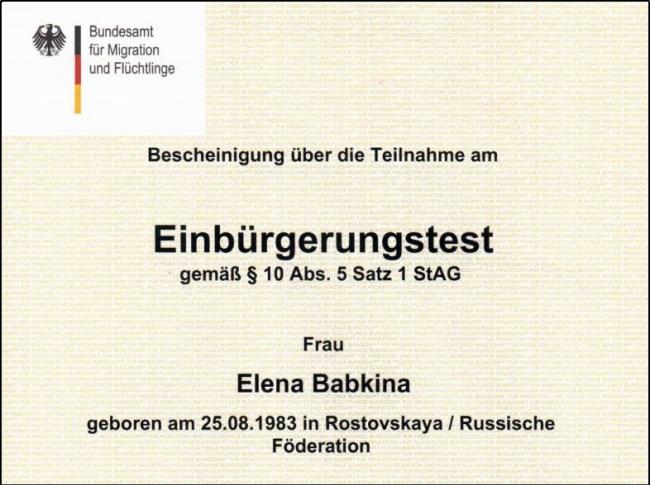
You will have to take a citizenship test before submitting your application to the Einbürgerungamt
Testing (Einbürgerungstest)
In September 2008, amendments to the law came into force, according to which migrants applying for German citizenship, in addition to a language exam, will have to undergo testing on German history, customs and legislation. The cost of the exam is 25 €, and paid preparatory courses are 150 €. In this case, the applicant has an unlimited number of attempts to pass the test. You can study the questions from the tickets and the correct answers to them yourself on the Internet on the website of the German Ministry of Internal Affairs.
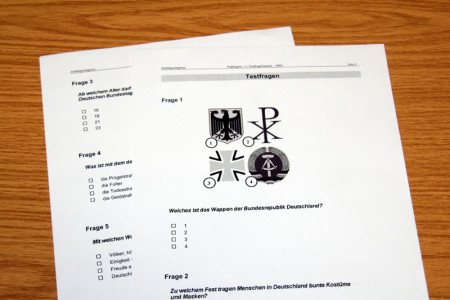
German citizenship test
Children under 16 years of age, foreigners educated in Germany (at least high school), disabled people and incompetent applicants are exempt from taking the test.
A total of 310 questions have been developed, which are grouped into thematic modules. Applicants will have to answer 33 tasks chosen by the examiner, including a couple of regional ones, in the federal state where the exam is taking place. In the capital they ask about the coat of arms and the age at which the right to participate in municipal elections begins. The minimum passing score is 52% or 17 correct answers. The questions are quite diverse, some are simple, some are complex, and some can even confuse a native resident.

Procedure for obtaining German citizenship
The procedure for granting citizenship to Germans is spelled out in detail. She perfectly demonstrates the pedantic German mentality.
Before applying for German citizenship you must:
- apply for a national German visa;
- obtain a residence permit;
- apply for permanent residence.
Late migrants receive citizenship immediately upon arrival.
Obtaining residence permit and permanent residence
The prerequisites for obtaining a residence permit and permanent residence are almost the same as for citizenship. These are jobs, family reunification, marriage, ethnic immigration. The exception is obtaining an education, because a residence permit issued on this basis does not allow one to apply for citizenship. Each of the grounds has its own procedure and the required duration of possession of a residence permit or permanent residence permit.
Collection and submission of documents
An application for German citizenship is submitted to the Ausländerbehörde (Office for Foreigners) at the place of residence. The application form can be obtained from the Einbürgerungsbehörde (Citizenship Office). Children over 16 years of age fill out the application on their own; those under 16 fill out their parents’ form.
The application will be accepted if the applicant:
- has permanent residence, blue card or Aufenthaltserlaubnis (residence permit, the purpose of which implies the possibility of extension for a long period);
- passed the citizenship test;
- lived in Germany for at least 8 years (7 years when completing an integration course, 3 years for spouses of German citizens);
- provides financially for themselves and family members, does not claim social benefits;
- speaks German at a sufficient level;
- has no criminal record;
- recognizes the constitutional values of the Federal Republic of Germany;
- expresses the intention to renounce previous citizenship (there are rare exceptions).
The procedure has many aspects left for the official's consideration. Thus, children or spouses of a migrant can be granted citizenship earlier than 8 years, if the main applicant has lived for the required period. By passing the German language test at level B2 and above, you can qualify for a reduction in the required period of residence by 1 year.
The list of documents that must be attached to the application for German citizenship depends on the basis for the application and, sometimes, the specifics of the legislation of the federal state. You can check this at the Einbürgerungsbehörde at your place of residence.
Citizenship test
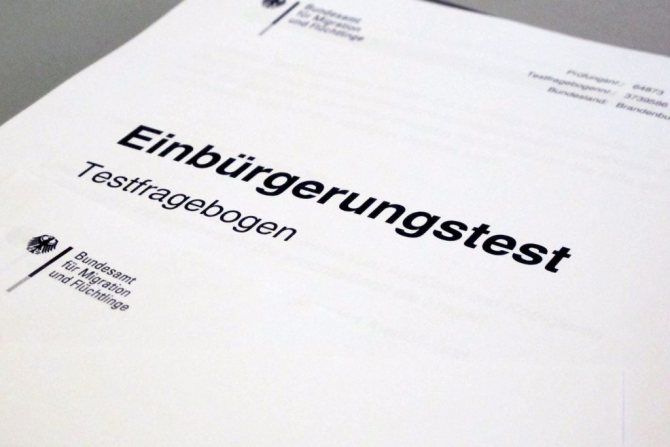
You cannot become a German citizen without passing a special test. It determines the applicant’s level of knowledge of the social and legal order, the German social system. It is handed over to the Federal Office for Migration and Refugees.
What is the test?
The exam asks you to answer 33 questions by choosing the correct answer from 4 options. 60 minutes are given for this. The test is considered passed if there are 17 correct answers.
Composition of questions:
30 on the topics “History and Responsibility”, “Life in a Democratic Society”, “Man and Society”; 3 according to the federal state in which the migrant lives.
The cost of taking the citizenship test is 25 euros. Based on its results, a Certificate with personal results is issued.
Graduates of German schools and persons who are unable to pass it due to disability or age are exempt from the requirement to take the citizenship test.
How best to prepare for it?
You can prepare for testing in the Online Center of the Federal Office for Migration and Refugees. The test consists of 310 questions, 300 of which are general and 10 are specific to the federal state. After selecting the answer, the correct one is shown.
You can also choose to take a practice test in the Online Center. The system will randomly select 33 questions. The correct answers and explanations for them will be shown after passing the test.
Some states offer test preparation courses. You can find out about them at your local Einbürgerungsbehörde (Citizenship Office).
Timing and financial costs
The fee for obtaining citizenship is 255 euros per person. For children receiving citizenship together with their parents, you must pay 51 euros. Large families are accommodated halfway and the possibility of reducing the duty can be discussed. But if a minor applies without parents, then you will have to pay the standard 255 euros for citizenship.
After paying the fee, the official reviews the application and attached documents. In case of a positive decision, a Guarantee of German citizenship is issued subject to renunciation of the past. The document is valid for 2 years, during which it is necessary to legally formalize the renunciation of “native” citizenship. After receiving the appropriate confirmation from the embassy, the German official will continue to review the documents. If more than six months have passed since the issuance of the Guarantee, all data will need to be completely checked again.
After checking the documents, the migrant is invited to the Einbürgerungsbehörde, where he reads the text about accepting German citizenship, signs and receives a Certificate of Acceptance of Citizenship. It contains the first name and patronymic transferred from Russian documents, and the patronymic is entered as a second name. Those who consider this to be inconsistent with German norms can change the name to whatever they wish.
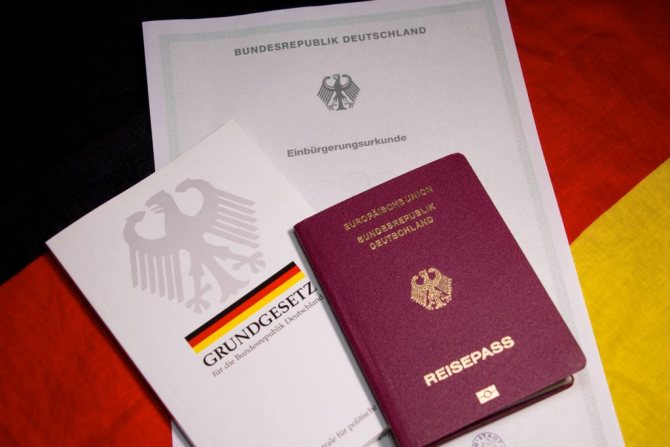
Obtaining German citizenship
Requirements for applicants
One of the indisputable conditions for candidates for German citizenship is the presence of a permanent source of income sufficient for comfortable living at least below the subsistence level. All family members who are dependent on the migrant are included in the calculation (wife, if she does not work, minor children, etc.). Social benefits and other assistance from the state or public organizations are not counted towards such income. If there are other financial sources, then social assistance is subject to deduction from total income.
An applicant for a German passport must not only have no criminal record, but also be free of minor offenses. For example, driving three times without a ticket within a year or a couple of fines for speeding will remove a foreigner from the desired status for at least a year. When the statute of limitations for all violations has passed and they no longer appear in the registry, you can apply for citizenship.

Basic Law of the Federal Republic of Germany
The next no less strict condition is the renunciation of all existing citizenships and the provision of a supporting document to the German Migration Service. An intention to refuse will not work, nor will a copy of the application. It is necessary to submit a certificate of absence or termination of Russian citizenship.
Conditions for acquiring German citizenship:
- Continuous residence in Germany under permanent residence for 8 years (the period is reduced to 7 years for migrants who have successfully completed the integration course, and in case of active participation in public organizations to 6 years).
- Certificate of language proficiency not lower than level B1.
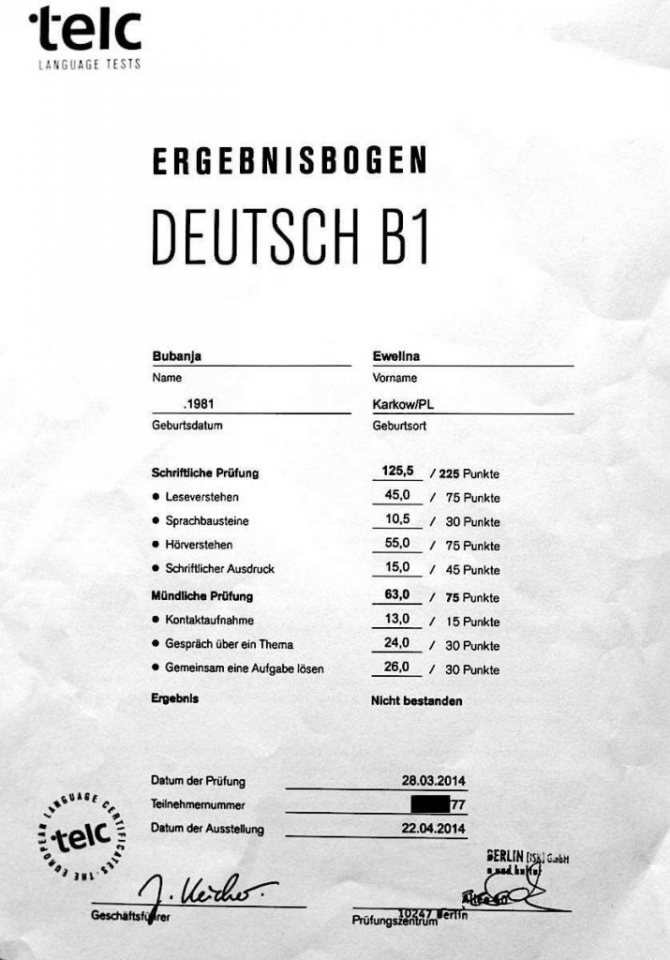
Sample certificate of knowledge of German language
- Take tests on the history, civil order and law and order of Germany.
- Confirmation of having a stable income at the appropriate level necessary to provide for yourself and your family, excluding social benefits.
- Certificate of good conduct and absence of minor offenses for a year.
- Commitment to respect all the values enshrined in the German Constitution.
- Refusal of all existing citizenships, including Russian.
Attention! Even if the applicant does not meet one of the conditions, he does not have the right to apply for citizenship.
However, some exceptions are allowed at the discretion of the official (Ermessenseinsbürgerung). Under this procedure, documents may be accepted from a candidate who is of particular social value, subject to certain minimum requirements being met.
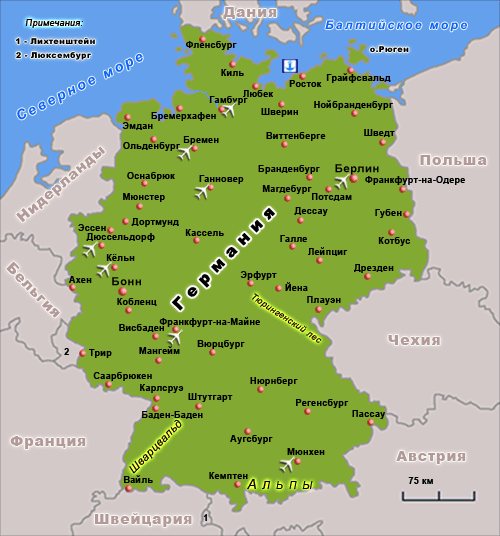
Germany map
Marriage bond
You need to know how to obtain German citizenship for a Russian citizen through marriage. The fastest and relatively easy way to obtain a German residence permit and citizenship is marriage to a German citizen. To do this, you must either already be married to a German citizen or a foreigner with a valid residence permit living in Germany (in this case, the marriage can be registered in Russia or in a third country, for example, in Denmark, since such a marriage is recognized by Germany), or intend to do this (in this case, a national German visa is issued, giving the right to get married in Germany). After three years, and if there is a child who is a German citizen, after two years, the spouse can submit an application to obtain the first independent residence permit.











